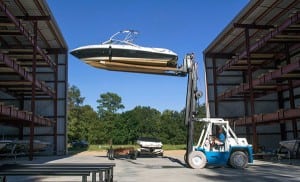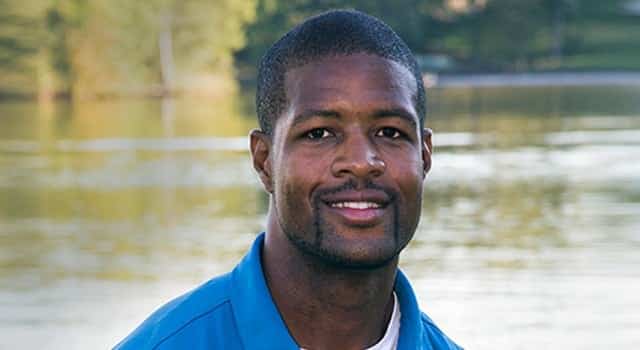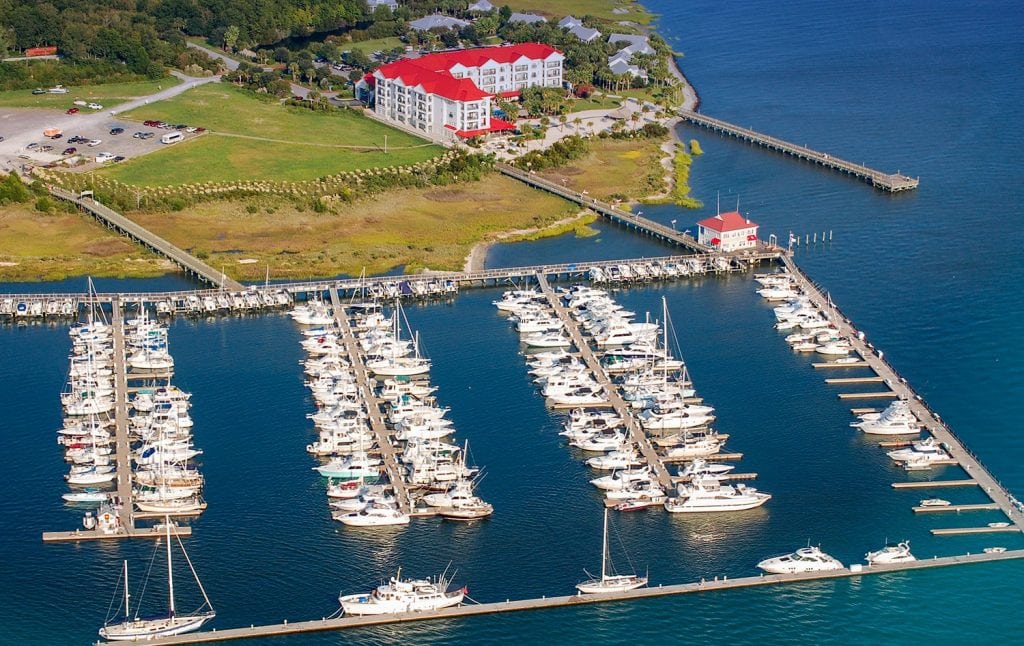Jerry Cash, 31, an Iraq war veteran, took over as marina manager at The Boathouse at Harbor Club in Greensboro, Georgia. Thankful for the opportunity the marine industry offered him upon his return from Iraq, Cash works tirelessly to get the new marina up and running with principles that were instilled into him during his time in the military—strive for the best and get the job done, no matter what.
SB: Tell me about what you’re doing now.
JC: What I’m trying to implement is an all-inclusive dry storage facility and marina, where customers can come and not have to worry about service, maintenance or anything in regards with their boat. I want them to come out, call in their boat, leave, go out, enjoy their day, then come back and drop it off. So that’s something that I’m pushing to do, such as getting a mechanic on hand . . . that’s one of my main goals here at the Boathouse.
This is a new marina; they completed construction last year. I believe it used to be like a campsite from what I heard, and a hangout spot for a lot of old timers. The restaurant was redone, gas pumps were added and the dry storage was built. But when I came on board in August, nothing really had been implemented [as far as logistics and the creation of the all-inclusive facility]. We don’t have a [forklift] so I had a special trailer made, where we can move the boat from dry storage to the water. It’s actually safer believe it or not because you’re not traveling with the boat on the forklift, it’s sitting on the trailer. I got the idea from one of the other facilities I worked at, so I kind of took some dimensions and had it made for me.

SB: How important is it for you to be able to implement that kind of all-inclusive service?
JC: That’s what boating is all about, your only concern should be getting here and to the boat, you shouldn’t have to worry about scheduling maintenance or details such as shrink wrap. . . . I just want to be a full service where customers just show up and get on the boat. I think it’s important to shoot for, customers are paying for storage and other amenities, so I want that to be the main focus of this marina.
I’m in the process of working out the maintenance, of determining whether I’m going to work something out with the local maintenance shop, where the customer can let me or one of my guys know that their boat needs to be serviced, or have someone on hand, maybe someone who’s versatile and can help dock the boats and do maintenance work . . . but shrink wrap and anything else to get the boat ready for winter, that’s something I can handle.
SB: What do you like most about your job?
JC: I like dealing with the customers, I like seeing them have fun while they’re out there. And at a marina, day-to-day operations are never the same, so it’s always a surprise coming in. New issues pop up. It never gets boring. There’s always something new to look forward to.

SB: Tell us about your background, where you’re from.
JC: I was born in Gardena, California, and I was raised in South East Los Angeles. After high school I joined the army and spent three years in service including a tour in Iraq. I was in Iraq from ’05 to ’06. I got back from Iraq in April and then got out at the end of that month. I was stationed in Fort Stewart, right outside of Savannah, Georgia. I had some family members, who moved from California to Woodstock, and I like Georgia, the slow pace, a lot slower than California and less expensive, so I just decided to stay out here.
SB: Is there anything you’ve learned while you were in the military that you still use in your day-to-day activities?
JC: Getting the job done. In the military if you’re handed an assignment it is your obligation to complete it, and I think that carries well to your work life. You start out with an idea and you pursue it until you get it done, just get the job done, see the task through. I think that’s one of the biggest things I took from the military. In the military you have to finish, you don’t have an option. Today for example I have a job, I know I could stretch out [my task] but that’s not part of me, so I get the job done, whatever it is.
SB: Did you grow up with a passion for the ocean, fishing, boating? How did that come about?
JC: Believe it or not I just kind of fell into it. I do have a degree in Information Technology, but when I got out of the military I was just job hunting and I started off part time at Little River Marina [in Lake Allatoona, Georgia] and just moved up the chain from there. Prior to that I had actually no experience with boats at all; I’d never been on a boat. Little River Marina offered me a part time position so I took it. At the time I had just gotten married so I needed an income. I started part time there, and I was doing construction. Eventually I was offered full time. I was there for about eight years. Before I left I got promoted to assistant manager, but prior to that I was operations manager.
SB: When was the first time you went on a boat?
JC: It was a few years when I was in Little River until I was able to take out a rental. It was a pontoon, a Harris float boat. I went out a little bit with one of the older guys who lived in the apartment complex I lived in. We did a little fishing with no luck; we didn’t catch anything, but it was a blast for the first time.
SB: Do you go boating more often now?
JC: Believe it or not, I don’t get out on the lake as much, but my experience with boats is plentiful, I tow boats daily, drive… I can drive just about any boats. I don’t get out as much as you would think working at a marina. I spend most of my time helping out customers making sure things are the way there’re supposed to be at the marina. Making sure people are having a good time on their boat, that’s my purpose.
SB: Would you want to own a boat?
JC: I do, definitely. Just a little 20-foot bowrider would be perfect for me and my little family; I have a 4-year-old daughter.
SB: Where do you see yourself in a few years from now?
JC: The marine industry has treated me pretty well, and I’ve developed a knack for it, so I think I will continue. I don’t know which avenue in the marine industry I’d like to pursue next, but I can definitely see myself sticking with it.
By Nathalie Gouillou, Southern Exposure, December 2015














